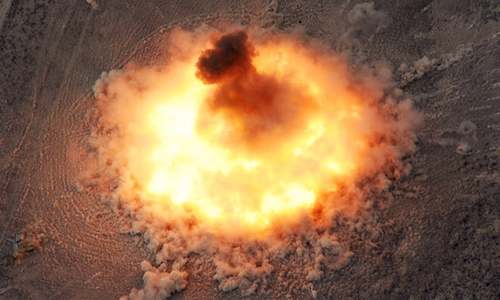WASHINGTON: US state and defence secretaries have said that the new Afghan strategy that the Trump administration is working on would ensure that terrorists do not use Afghanistan as a safe haven again.
A transcript released by the Pentagon in Washington quotes the two leaders as confirming media reports that the Trump administration was finalising a new US strategy for Afghanistan, which would seek to eradicate terrorism and ensure the continuation of the present setup in Kabul.
“Our commitment to Afghanistan is to ensure that it never becomes a safe haven for terrorists to launch attacks against the civilised world or against any other part of the world or any of their neighbours,” said Secretary of State Rex Tillerson when asked what assurances would the new policy offer to Kabul.
He said that since the new policy was still under review, it would be premature to say what conclusion it draws but indicated that the new strategy would include military plans to stabilise Afghanistan.
“This is really a question of what is the end state and how do we reach that end state, and that’s part of the policy review that is still under development,” he said. “But … we are committed to ensuring Afghanistan does not become that platform from which terrorist activities can be launched.”
Defence Secretary James Mattis said that in Afghanistan the United States was fighting an enemy that “knows that they cannot win at the ballot box, and … that’s why they use bombs.”
The United States, he said, would stand by the Afghan people who “have had a long, hard fight” and while the new strategy was still under review, “the bottom line is we’re not going to surrender civilisation to people who cannot win at the ballot box.”
The two senior members of the Trump administration made these comments at a press availability on Monday on the sidelines of an international conference in Sydney, Australia. The Pentagon’s transcript also included comments Australian Foreign Minister Julie Bishop and Defence Minister Marise Payne who said that Australia would continue to support US war efforts in Afghanistan and would send 30 additional troops to join the US-led military coalition in that country.
“That (terrorism) is not something we are ever prepared to see take hold in Afghanistan again.,” said Mr. Payne while explaining why Australia was participating in the US-led war in Afghanistan. “It must never be allowed to be a platform for terrorism as it was in the past, and we will continue to make that contribution,” he added.
When a journalist reminded Secretary Tillerson that the main thrust of his question – “what was … the wisdom of adding more US troops and resources to a war that has been stalemate for years” – he said: “I would reserve my answer until the policy review is completed. It needs to be thought of in that context.”
As the United States weighs options in Afghanistan, Pakistan hopes that any use of military force would be tied to a push for a political solution to the conflict. Pakistan’s envoy in Washington, Aizaz Ahmed Chaudhary, underlined this, and Islamabad’s other concerns, in an interview to The Washington Times newspaper, published on Monday.
“How does the United States want to deal with their huge investment in Afghanistan, both militarily and economically? We are waiting for it,” said Mr Chaudhary.
Reports in the US media suggest that the Trump administration wants to send up to 10,000 additional American and Nato troops to Afghanistan, hoping that the increase would enable the Afghan security forces to defeat a stubborn enemy, which has entangled the United States in its longest foreign war.
President Donald Trump was expected to finalize this new strategy during his visits to the Middle East and Europe and announce it after returning to Washington. He returned on May 27 but officials at the White House say that they are still working on various proposals.
“We think that the United States also wants to stabilise Afghanistan,” said Ambassador Chaudhary when asked what he thought would be the thrust of the new US strategy. “Why? Because you have invested hugely in blood and in treasure for the last 15 to 16 years [there].”
A “modest surge” of American forces now, said Mr Chaudhry, might pressure the Taliban to embrace peace talks with the US-backed government in Kabul that have stalled for years. “Once [the Taliban] are weakened, they will come to the table,” the ambassador predicted, but he said the Afghan government should lead the peace process.
Also, on Monday, US National Security Advisor Lt. Gen. H. R. McMaster telephoned President Ashraf Ghani of Afghanistan and “underscored America’s steadfast support for the National Unity Government,” the White House said.
He recognised that because terrorists were seeking to divide the Afghan people, “it is more important than ever … to remain united and be strong in our resolve to achieve the security and peace that the people of Afghanistan deserve.”
President Trump also called Mr. Ghani after Wednesday’s massive bomb attack that killed 90 people and assured him of continued US support to Afghanistan.
Published in Dawn, June 7th, 2017













































